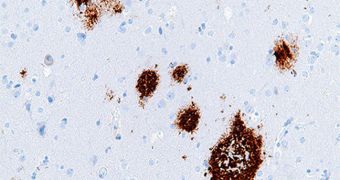A series of drugs commonly used to treat cancer show great promise in reversing memory loss in animal models of Alzheimer's disease. The same holds true for a number of synthetic compounds that have not been tested thus far.
The conclusion belongs to a new study by investigators at the Cold Spring Harbor Laboratory (CSHL), who worked closely with Chinese colleagues. The work is detailed in the September 24 early online issue of the esteemed journal Proceedings of the National Academy of Sciences (PNAS).
According to lead researcher Yi Zhong, PhD, a professor at CSHL, the investigation was conducted on both fruit flies and mice. The team used two independent experimental approaches to test their hypothesis, and were able to obtain the same results. This represents a major step forward.
The research focused on senile plaques that develop in the brains of Alzheimer's patients, and are caused by accumulations of the beta-amyloid protein. This molecule is slowly, but surely, emerging as the main target in treating this neurodegenerative form of dementia.
In the new experiments, scientists wanted to see if targeting the epidermal growth factor receptor (EGFR) could reduce the severity of memory loss in the two animal models. Results showed that this was indeed the case.
Focusing on ways of addressing beta-amyloid-induced memory loss, the international team analyzed a series of 2,000 synthetic compounds, in a bid to determine if any of them was effective at restoring this neural function.
Only 45 of them proved effective in fruit flies after 8-9 weeks of testing, and were then administered to mice. Only four of these substances showed beneficial effects in the rodents after two months.
“We were amazed to find that three of these compounds – designated JKF-006, JKF-011 and JKF-027 – not only showed effective results in rescuing memory loss in the mice, but also, in test-tube-based experiments prevented Aβ-42 from activating human EGFR,” Zhong says.
The new research effort was jointly supported by the Cold Spring Harbor Laboratory, Dart Neuroscience, the Ministry of Science and Technology of China, and the Tsinghua-Yue-Yuen Medical Sciences Fund.

 14 DAY TRIAL //
14 DAY TRIAL //